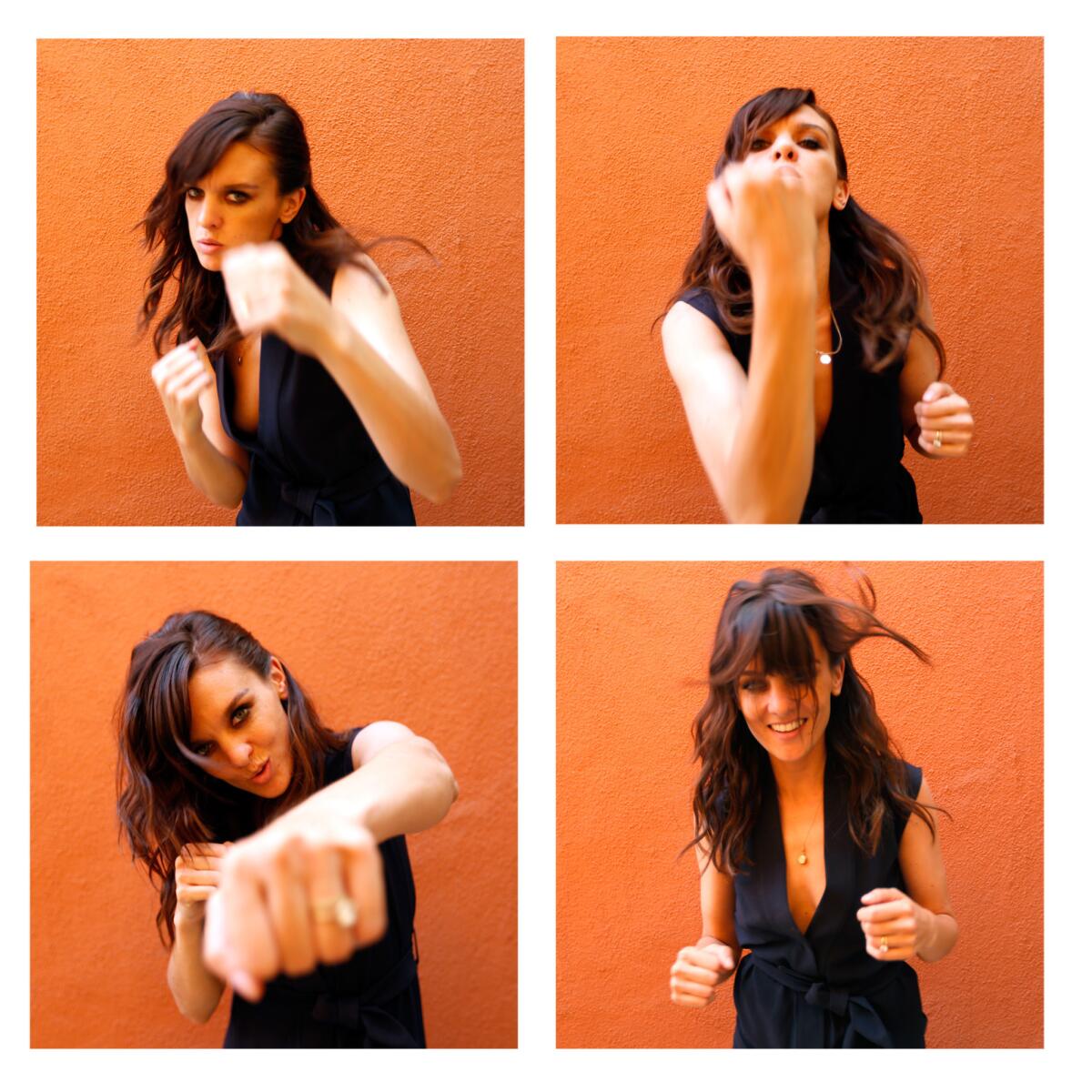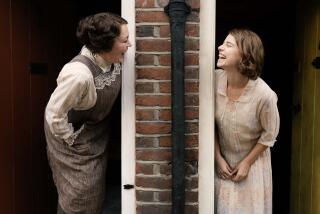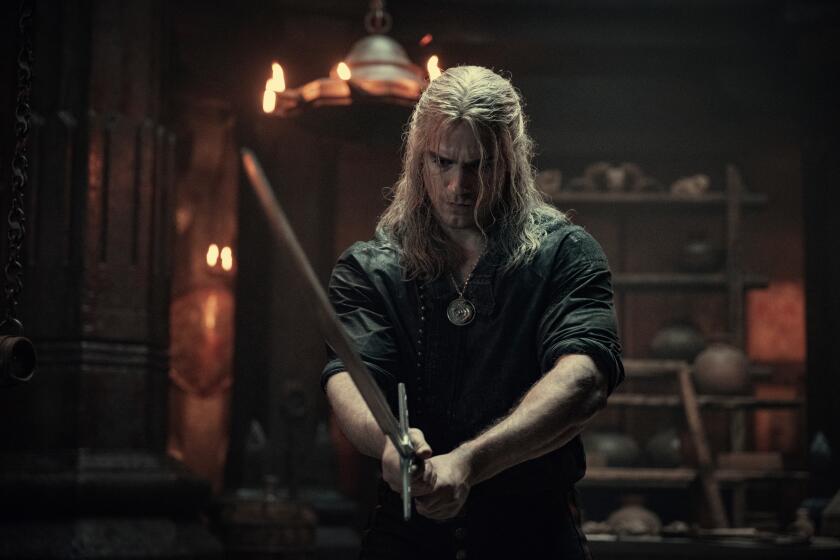Frankie Shaw aims to shine a light on a seldom-seen female perspective with ‘SMILF’

Frankie Shaw was 20 when she showed up outside the office of writer-director Katherine Dieckmann armed with a letter and an offering of bagels. And grit. Always some grit.
After taking a semester off her junior year — a period in which she worked as a lobster fisherman in Maine — the Boston native found herself one credit shy of graduating from Barnard College in New York. Studying English literature, Shaw had ambitions to write her first script, so she propositioned Dieckmann, an associate professor in the MFA program at Columbia University, in the spring of ’07 in hopes that she’d work with her in an independent study capacity. Dieckmann, as Shaw remembers it, initially said no.
“So I wrote her this long letter begging her to take me on,” says Shaw, now just shy of 31. “I just remember wanting it so badly and, I don’t know, I guess I thought showing up with some bagels and cream cheese would help my cause.”
Dieckmann, that day, relented. And Shaw, whose full name is Rachel Frances Shaw, would go on to write her first script about an isolated girl in South Boston who falls in love with a veteran with PTSD.
This is, by all accounts, typical Frankie: nevertheless, she persists.
A smirk slinks across Shaw’s face — the kind that sheepishly recalls God, I really did that — as she sits on a couch inside her office at Sunset Gower Studios in Hollywood and recounts what led her to this moment: writing, directing, executive producing and starring in the new Showtime dramedy “SMILF.”
The half-hour series, which premieres Sunday, is loosely based on Shaw’s life and follows the raw struggles of Bridgette Bird (Shaw) a working-class single mother to a toddler son, Larry (yes, as in Larry Bird), who splits her time between tutoring and acting to make ends meet. The South Boston-set series also stars Rosie O’Donnell, in her first series regular role, as Bridgette’s guilt-inducing mother, Tutu. The series is adapted and expands on Shaw’s short film of the same name, which won the Sundance Film Festival’s jury award in 2015.
“I wrote the original short because I was tired of struggling to make ends meet with a 2-year-old son,” Shaw says. “It was me trying to make something happen for myself that wasn’t happening on its own.”
Showtime Chief Executive David Nevins told The Times at the show’s premiere screening last month that he responded to the “underdog nature of [the show] and the smart blue-collar oomph it brings.”
“And the thing that makes Frankie fun to watch is,” he added, “is there’s more going on behind her eyes than just what she’s saying. I think that’s a really good quality for a star of a show to have.”
“[“SMILF”] was me trying to make something happen for myself that wasn’t happening on its own.”
— Frankie Shaw
“SMILF” marks a crowning moment for Shaw, whose son, Isaac, is now 9 years old. After years of fitting into someone else’s narratives, with mostly background roles in such TV series as “Mr. Robot” and “Good Girls Revolt” and films like this year’s “Stronger,” Shaw is now both the face of and the creative force behind a premium cable show.
“She’s very much the same as when I met her all those years ago,” Dieckmann says by phone. “She’s a really passionate, wild personality. I’ve just always been really attracted to her energy and her charisma and her drive. And she’s always had this great head for turbulent women’s narratives.”
“SMILF” is an example of that. At a time when there’s a generation of young storytellers offering fresh perspectives on the angst of coming into your own as a young adult, with her dark comedy Shaw adds motherhood — with all its complexities and joys — to the mix.. The series is an unflinching and at times uncomfortable look at a working-class mother trying to make it. A premium-cable version of “Roseanne” for the millennial generation.
The premiere episode, for example, includes a scene in which Bridgette, who sometimes binge-eats, bolts to the corner store, leaving her child unattended while he sleeps, so she can load up on snacks.
“The scene where Bridgette leaves Larry alone was in my original draft in 2012,” Shaw says. “And it survived a lot of people trying to cut it.”

As for the show’s title, which is a play on the acronym for viewing a mother as a sex object, Shaw says it’s supposed to be ironic. (She emails after the interview to elaborate.)
“Milf is a term used by men to categorize a certain ‘type’ of woman,” she writes. “The ‘I’ in MILF is only the male [point of view], a woman HE would like to sleep with. But in SMILF, the story is Bridgette’s. By telling the story from her [point of view], getting inside her life experience, we are in a sense changing the meaning of that word, reclaiming it as something else, something of our own.”
Shaw is interested in saying something with the series. The first season explores class issues, mental health, addiction, sexual violence, politics and race.
The themes are in keeping with Shaw’s body of work — whether it be that first script she penned in college or her other short film, “Too Legit,” which was a satire about campus sexual assault that was inspired by statements made by former Congressman Todd Akin, in which he said that “legitimate rape” rarely causes pregnancy.
“I am fully a feminist in this modern definition of the term,” Shaw says. “It’s innate in my work because that’s just who I am. Most of the stories I write are women’s stories — but the darker, unseen stories.”
O’Donnell, for one, finds hope in that: “To think that we, as a feminist movement, have allowed the stage for a young woman like that — at 30 years old — to do what she is doing gives me a tremendous amount of inspiration and reminds me that, even though things might look bleak out in the world, there are these outliers who are getting it and going to be the ones creating the cross-culture narratives for decades to come.”
Sitting in her office with a bag of tortilla chips by her side during her lunch break on set, Shaw is in sweats and an oversized shirt (her character’s outfit for the day) trying to find time to eat, but also checking her phone frequently to make sure there aren’t loose ends that need tying up on the episode she is directing or last-minute questions before production moves to Boston. All the while, she insists she’s the boring version of Bridgette.
But those who’ve worked with her say there’s nothing boring about Shaw.
“On the surface, you expect certain things no matter how much of an enlightened feminist you are,” says friend and “Good Girls Revolt” creator Dana Calvo, a former staff writer at The Times. “And what you get instead is someone who could move easily between glamour parties of West Hollywood and neighborhoods of South Boston, who can speak with her excellent literary references about feminism and literature and psychology and religion, and then can also sit there and have about 100 emotions pass over her face as she’s playing the character of a single mom with needs and wants … I loved the complexity and the surprise that she brings.”
Filmmaker Paul Feig, who mentored Shaw while he was working on the female-fronted “Ghostbusters” reboot, praised her instincts and curiosity about the business. He recalls inviting her to the editing room on the film. In the room was Feig’s producing partner Jesse Henderson and producer Amy Pascal (former CEO of Sony Pictures).
“It was an intimidating room for somebody who’d never been in that situation,” Feig says by phone. “She just came in very comfortably and sat with us and then I had her give her notes first and she went over all these notes in a very confident way. And I remember she left, Amy and Jesse were like, ‘wow, those are great notes’. And I’m just like, ‘yeah’… the irony is, Frankie didn’t need a lot of mentoring.”
Not that storytelling had always been Shaw’s ambition. The grit and drive, though, were always there. Like her character, Shaw comes from a working-class household. Her father was out of the picture by the time she was 4, and her mom worked as a loan officer.
Frankie didn’t need a lot of mentoring.
— Director Paul Feig
While working as a short-order cook at a country club in high school, Shaw was told by a teen member there that she should consider attending Milton Academy, a tony prep school in Massachusetts.
“I essentially stalked this private school and begged my way in and said I needed to go there for free,” Shaw recalls. “And eventually they were like, fine. I got a scholarship. And all of a sudden I was in this place where everyone wore J. Crew peacoats and I begged my mom to get me one so I could fit in.”
It was while living in New York for college that Shaw felt the pull to the creative world.
“I started seeing art-house movies and taking photography classes,” she says. “I really had had no culture. I think that I am still playing catch-up. I was just, like, so in this bubble.”
Shaw, who is now married to writer-producer Zach Strauss, is mindful of how far she’s come.
“My husband said to me, ‘you know, you’re living your dream,’” Shaw says. “And I am. The dream I didn’t know I could dream. And I cry. When I first had Isaac, I only owned a mattress. Now I have a show?”
The most-read Entertainment stories this hour »
‘SMILF’
Where: Showtime
When: 10 p.m. Sunday
Rating: TV-MA (may be unsuitable for children under the age of 17)
Twitter: @villarrealy
More to Read
The complete guide to home viewing
Get Screen Gab for everything about the TV shows and streaming movies everyone’s talking about.
You may occasionally receive promotional content from the Los Angeles Times.







